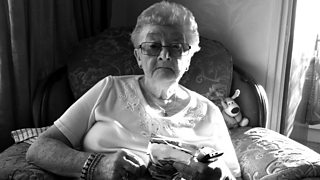Tainted love: Waiting for George
Jean’s Story

Jean is 73. She lives alone in her home in the North of England, which she shares with her two beloved cats. Lonely? Possibly, but then ‘Jean is never ever really alone.’
She’s had a difficult life: a difficult relationship with her mother; a happy marriage with Frank, a lovely man but who died at the age of 50; the tragic death of her teenage daughter in a car crash; a disastrous relationship with an abusive man who knocked her teeth out and broke her nose. But now there’s another thing to worry her…
Jean and George
Jean met George, 79, through a mutual friend. She was looking for ‘companionship, someone to talk to,’ but this isn’t how things worked out. The couple wed in 2006, but after a long and unhappy marriage, Jean asked George to leave in April 2015: ‘he’s a horrible, evil little man’. Only he didn’t leave. ‘Phonecalls, knocking on my door, making threats, you name it,’ says Jean. There's been further harassment too, with love letters, throwing stones at her window, swearing and claiming she has ‘another man’ she goes out with every night.
A letter posted through Jean’s door contained the words ‘you’ve won, you can get married'; ‘I love you’ was written on the envelope.
It’s now September and George has been in court once and pleaded guilty to harassment. The police are aware. The judge told him to ‘keep away from Jean’. But that's not the end of it: Jean finds herself a prisoner in her own home, too scared to go to the shops in case she runs into George. It’s a nightmarish situation made all the more apparent by her age.
An Unwelcome Visit
While recording for the programme George turns up outside Jean’s house, and says he wants to borrow a lighter. Jean, frustrated and upset, calls the police for the second time that day.


The question that’s been hovering in the background - the one thing that could explain George’s actions ‒ is now asked: ‘Is George ill?’ Jean is convinced that he isn’t. She thinks the way he treats her is not a symptom of senile dementia, but simply cruelty designed to threaten her. She says she wants him to be punished by prison: ‘Only a month, that would do me.’
Over the following weeks the harassment continues, but as we enter October Jean's afforded a little respite as George's visits become less frequent, and she is able ‒ for the first time in six months ‒ to leave the house on her own.
Her relief doesn't last long when, on 9 October (the date of George's court appearance), George is granted bail.
The Court Case
‘And here we are at the magistrates' court’ ‒ words spoken by Jean’s friend: it's now the 20th of November. Everything in Jean’s life has now become about George, and he’s as big a part of her life as if they were still living together. The outcome of this case has the potential to change her life, and his, forever.
However, things are rarely that simple when relationships go wrong and this case is no exception. The defence says George has been deemed fit to plead and that George accepts the charges of harassment, but they also say George needs more neurological assessment. The prosecution accepts George is in the early stages of dementia but how that affects his behaviour is not yet established. The case is ‘hamstrung’ by a lack of psychiatric assessment. So, where does this leave Jean?
The judge passes a sentence which puts George on trust ‒ a conditional discharge ‒ ,which means if George carries on contacting Jean he’ll have to go to prison. For now, at least, Jean feels the outcome has brought her ‘a little bit of light at the end of the tunnel' ‒ but will it last?




